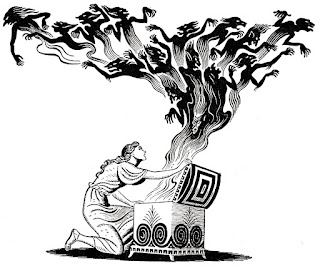HOPE SPRINGS ETERNAL
Pandora was the first human woman in Greek mythology. She was
entrusted with a jar, on condition that it remained closed. When her curiosity
got the better of her and she opened it, all the world’s sorrows, plagues, etc.
escaped. When she managed to close it - only hope remained.
Pandora was the first human woman in Greek mythology. She was
entrusted with a jar on condition that it remained closed. When her curiosity
got the better of her and she opened it, all the world’s sorrows, plagues, etc.
escaped. When she managed to close it - only hope remained.
Hope is an existential necessity in a life clouded
by uncertainty. I believe hope is what enables the survival of
the Jewish people. Without hope for a better future, how could a
people suffer the unbearable “present” throughout the ages, whether it was
programs, exile, persecution, genocide.
The stories comprising the narrative of the Jewish people as
written in the Pentateuch, invariably show an unforeseen future. The first
story begins with God’s call to Abraham to leave his land, birthplace and his
father’s house to travel “to the land that I will show you.” Genesis ends with
Jacob and his family forced into exile, with the future promise unfulfilled.
In Exodus, comes the encounter in the burning bush between God and
Moses. God calls Moses to lead the Israelites back to freedom and the promised
land. When Moses asks God what name he should use when people ask him He
literally answers “I will be what I will be”, in the future tense. But
closure doesn’t come. In the final scene in Deuteronomy Moses is still on the
far side of the Jordan.
The bible ends in Chronicles II with the Israelites in exile, this
time in Babylon, Cyrus gives them
permission to return to Israel but the promise again remains unfulfilled.
Unlike other narratives the Jewish one has a beginning but no end.
In the words of Rabbi Jonathan Sacks: “to be a Jew is to be an
agent of hope in a world serially threatened by despair. Every
ritual, every commandment, every syllable of the Jewish story, is a protest
against escapism, resignation or the blind acceptance of fate” - unlike Greek
mythology which claimed that human destiny lay in the stars, or blind faith.
The fundamental belief in the Jewish future still to be realized is ultimately a belief in freedom. Society is
how human beings shape it - there is nothing inevitable in it. It is not
surprising that Jews have strived to be in the forefront in fighting poverty,
injustice, natural disasters, etc. Israel is still today the only free society
in the Middle East.
Human beings are the only form of life capable of using the future
tense. Only humans can envisage a better future and the freedom to implement
change. After the Holocaust, Jews did not seek revenge or harbor resentment.
Instead they turned to the future and built up a land with a national anthem
called “Hatikvah” (“the hope”).
After more than 2,000 years of exile, Jews of today have been given
the extraordinary privilege, and responsibility, to make a new beginning for
their people. Let us hope and pray that this time the Jewish
narrative will also have a happy end - for all.
As Rabbi Sacks wrote: “Judaism is the only civilization whose
Golden Age is in the future: the messianic age, the age of peace when ‘nation
will not lift up sword against nation….’ “.



Comments
Post a Comment